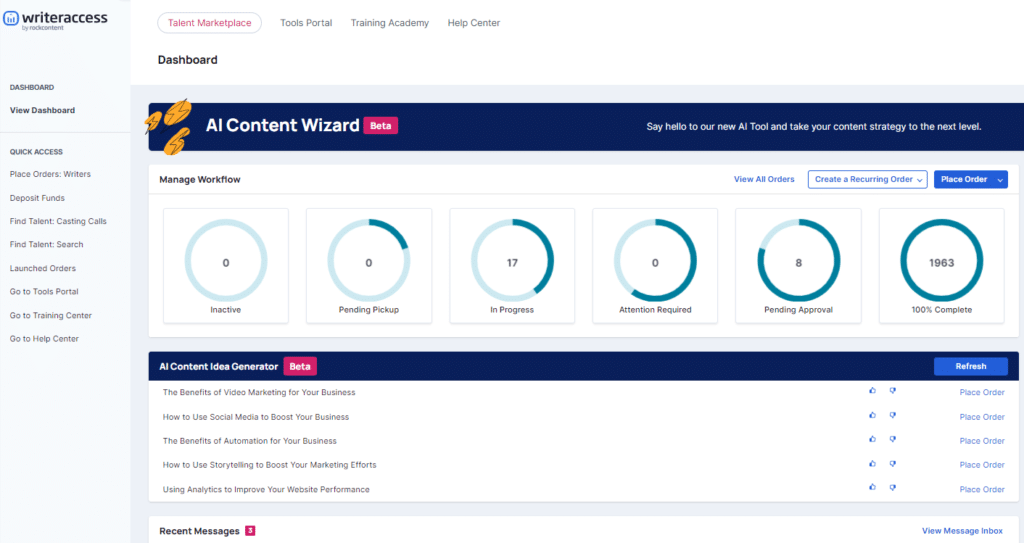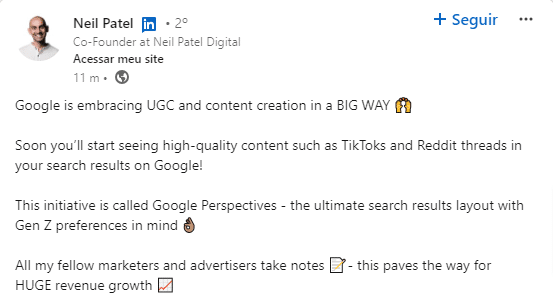There is no denying: Digital Marketing completely changed how companies fight for the audience’s attention in the last years.
Investing in online marketing for small businesses is democratic and brings a lot of benefits.
With the right software for small business, you can create a low-cost strategy that demands only a small team to work, and have a big return in reach and awareness.
However, if promoting a brand on the internet is easy, it also means that there is a lot of competition. In this article, you will learn:
Download this post by entering your email below
1. Search Engine Optimization (SEO)
One of the most powerful ways of bringing constant visibility to your brand isn’t paid.
This might sound a bit strange since mass media advertisement has been the main way of being seen for so long.
Today, having a strong online presence is equivalent to having your website, product, or content appear at the top of search results when a consumer searches for a relevant keyword.
Being well positioned in search engines is a way of getting organic traffic and building trust — since it may be the first contact a person has with your brand.
After all, if your website is there, it means it is worth it, right?
The techniques, actions, and tools that make your brand climb those spots are called Search Engine Optimization, or SEO.
Its goal is to make Google recognize the value and relevance of what you have to offer, so it favors your brand when users search for specific keywords.
Thus, SEO is essential when it comes to Digital Marketing for small businesses.
How small businesses can do it
Achieving the top position in search results is not something you can simply purchase, but effective SEO requires a certain level of investment, particularly in terms of effort.
If you are small, the best thing to do is to work with a reduced scope and grow from there.
Your primary focus should be on intelligent keyword planning. SEO is about user intention, content production, and link building — all of that around the words that are most likely to be searched by your buyer persona.
With a lower budget, you can begin with less common and more specific keywords. If you sell phones, for example, betting on the word “phones” isn’t the best strategy.
There will be a lot of companies, some of them really big, fighting for that spot. So how about finding more specific terms to work with?
Learn more about your persona and try to think like them. How would they search for a product that interests them? What would they type?
Data intelligence can be the key to finding your niche.
2. Content Marketing
Using content to promote your company is always part of a great SEO strategy. But it is much more than using the right keywords.
Producing relevant, useful, and attractive content is how your brand builds identity, personality, and authority.
Content Marketing involves planning and sharing posts, articles, news, videos, and any sort of material that brings value to your audience.
This kind of marketing isn’t only about information, but also timing and presentation. What, how, and when you write are points to take into consideration.
How small businesses can do it
For small service and eCommerce companies that can’t invest in sheer volume, the center of the strategy should be a blog.
There, you can share how-to guides, tips, ebooks, and everything useful to help a lead consider a product you sell. For example, your product is Kodi. You can make a detailed overview of all the versions, so the customer can know what is Kodi Builds and make a choice.
Frequency is important, so try to have at least 2/3 blog posts a week. You can use social media to boost your content’s reach and mix new pieces with reposts to keep your persona engaged.
But the main thing you should strive for is being honest and offering reliable information that helps. When a brand starts to become known as an authority in a specific field, it sticks in the audience’s mind.
Even if the consumer isn’t buying anything now, they will remember you when the time comes in the future.
To support you in this task, there are content creation platforms like WriterAccess. Through these platforms, you can connect with talented freelance writers, proofreaders, and editors who can create content at scale for your business. WriterAccess provides a 14-day free trial, and even small businesses can choose from affordable plans that meet their needs.

3. Social Media Marketing
We discussed social media as an amplifier, but you should not treat it as a simple way to share and boost visibility. Like everyone else in those networks, your company is there to build relationships too.
Social Media Marketing is focused on the personification of your brand. You should be available for answering questions, as well as interacting with people and subjects that are inserted in the same universe as your business.
Remember: “It’s important to be where your audience of potential customers is today, and where they might be tomorrow. It’s better to be ahead of the curve than behind.” – said Andrew Delaney, Social Media Marketing Manager at HubSpot.
How small businesses can do it
If you have the resources, it’s ideal to have someone dedicated to managing social media accounts—whether it’s an employee or an outsourced professional. Social networks require continuous interaction and staying up-to-date with current trends.
However, if you don’t have the team or budget for it, here are some strategic alternatives:
Consider investing in tools that automate and consolidate social interactions. These tools can help streamline your social media efforts.
Another practical idea is to set aside small intervals throughout the day to check and engage with your social media profiles.
Furthermore, even if you have limited funds, allocating some budget towards social media advertising can be a wise investment. Social ads are attractive, engaging, and can significantly enhance your lead generation efforts, with Instagram proving particularly rewarding for this strategy.
4. Local Search
If your business has a physical location, Google My Business has become a great channel for your brand. You can use this tool as a location-based marketing effort.
How small businesses can do it
Adding information about your company on Google My Business is easy and simple. There, you can share your contact information, your website, and even information about what you sell.
But the main focus here should be on user-generated content: ratings, opinions, and photos. When a client posts those on Maps, they are included in your profile and shared with everyone searching for something in the area.
As pointed out by Neil Patel:

So, you can ask for this kind of engagement on your website and via social media. You can also offer a reward in exchange, such as a dessert on their next visit if you are a restaurant.
That way, you build a complete and compelling profile for anyone in the area. At the same time, you start to build a global presence and local dominance.
5. Email Marketing
Even being invented in the 1970s, email is still one of the most prominent and used communication channels on the planet.
So it is no surprise that Email Marketing is great for businesses.
This strategy involves planning informative and engaging content combined with action-based and time-based triggers.
The idea is to create a path that deepens the relationship between a lead and a brand by being in close and constant contact, all of that without having to manually send and respond to these interactions.
How small businesses can do it
The great thing about email marketing is: it is almost solely based on automation. Unlike Social Media, you don’t need to have someone dedicated to it every day.
But it demands a lot of planning. The ideal Email Marketing campaign takes the buyer’s journey into account and anticipates the lead’s moves from interest to purchase decision.
With the right automation tools like Mailchimp, Constant Contact, and SendGrid alternatives, you can just plan the nurturing flows and let the software work by itself.
It is a great channel for small businesses, those who know their audience, and the importance of analyzing metrics.
6. Influencer Marketing
Influencer marketing involves partnering with individuals who have a strong following and influence in your industry or niche.
These influencers can range from social media personalities to industry experts or bloggers. By collaborating with influencers, you can tap into their established audience and credibility to promote your products or services.
How small businesses can do it
To implement influencer marketing, start by identifying relevant influencers who align with your brand values and target audience.
Just because you’re still small, it doesn’t mean you can’t try to hang out with the popular guys. Reach out to them and propose a partnership or sponsored content arrangement.
This can involve various forms of collaboration, such as product reviews, sponsored posts, guest blogging, or social media takeovers. The key is to ensure the influencer’s content resonates with their audience and integrates your brand naturally.
7. Video Marketing
Video marketing has gained immense popularity in recent years as it provides a dynamic and engaging way to connect with your audience.
Videos can be used to share valuable content, demonstrate product features, showcase testimonials, or tell compelling stories about your brand.
How small businesses can do it
To leverage video marketing effectively, start by defining your objectives and target audience. Determine the types of videos that will resonate with your audience, whether it’s educational tutorials, behind-the-scenes glimpses, or entertaining content.
Choose the appropriate platforms to share your videos, such as YouTube, social media channels, or your website. Consistency is key, so develop a content calendar and regularly produce and share videos to maintain engagement.
AI can also help you with this task. AI tools for video marketing include AI-powered video editing software (e.g., Adobe Premiere Pro, Final Cut Pro), video analytics platforms (e.g., Vidyard, Wistia), and AI-driven voice recognition technology (e.g., Google Cloud Speech-to-Text, IBM Watson) for automatic captioning and subtitles. These tools streamline video creation, improve performance analysis, and enhance overall video marketing strategies.
8. Pay-Per-Click (PPC) Advertising
PPC advertising allows you to display targeted ads to users who are actively searching for relevant keywords or browsing specific websites. It can be an effective way to drive immediate traffic, generate leads, and increase conversions.
How small businesses can do it
To implement PPC advertising, start by selecting the right platform based on your target audience. Google Ads is a popular choice for search engine advertising, while social media platforms like Facebook Ads and LinkedIn Ads offer robust targeting options.
Conduct thorough keyword research to identify the keywords relevant to your business and create compelling ad copy that entices users to click. Set a budget, monitor your campaigns regularly, and make necessary adjustments to optimize performance and maximize ROI.
You don’t need to spend tons of money on PPC, it’s just a way to boost your online presence while you invest your time in strengthening your tactics to generate organic traffic. If you do it right, there will be a day when you won’t need to spend even a cent on PPC.
9. Marketing Solutions and Services
Our last item in this list isn’t a marketing strategy per se, but a kind of investment that is crucial for having success in all we have talked about until now.
Marketing solutions are technological platforms, automation tools, data analyzers, and social media monitors that help small teams with small budgets. So, they can manage campaigns way bigger than what they could do by themselves.
Marketing services are offered by companies with specialized talent and tools to help your business plan, execute, and measure the success of your strategies.
How small businesses can do it
Until a few years ago, it was quite challenging for small companies to access high-end marketing solutions. However, the rise of “solutions as a service” has empowered these businesses.
Instead of making large upfront investments, you can now opt for monthly or yearly plans that spread costs and provide flexible resources to meet future demands.
In today’s online marketing landscape, the size of your company or available budget matters less. What truly matters for small businesses is being smart and innovative.
So, discover the perfect digital marketing tool for your small business and start planning. Gaining a deeper understanding of your audience and effectively utilizing these channels to reach them will pave your way to success.
And remember: when it comes to content creation, WriterAccess is here to help.
With a pool of talented freelance writers, proofreaders, and editors, we can assist you in crafting engaging content that resonates with your target audience.
Plus, take advantage of our 14-day free trial to experience the benefits firsthand. Start creating remarkable content today with WriterAccess and propel your small business toward success.



![[ROCK NA] [EBOOK SEO] Complete Guide](https://rockcontent.com/wp-content/uploads/2024/06/banner_Search-Engine-Optimization.png)






